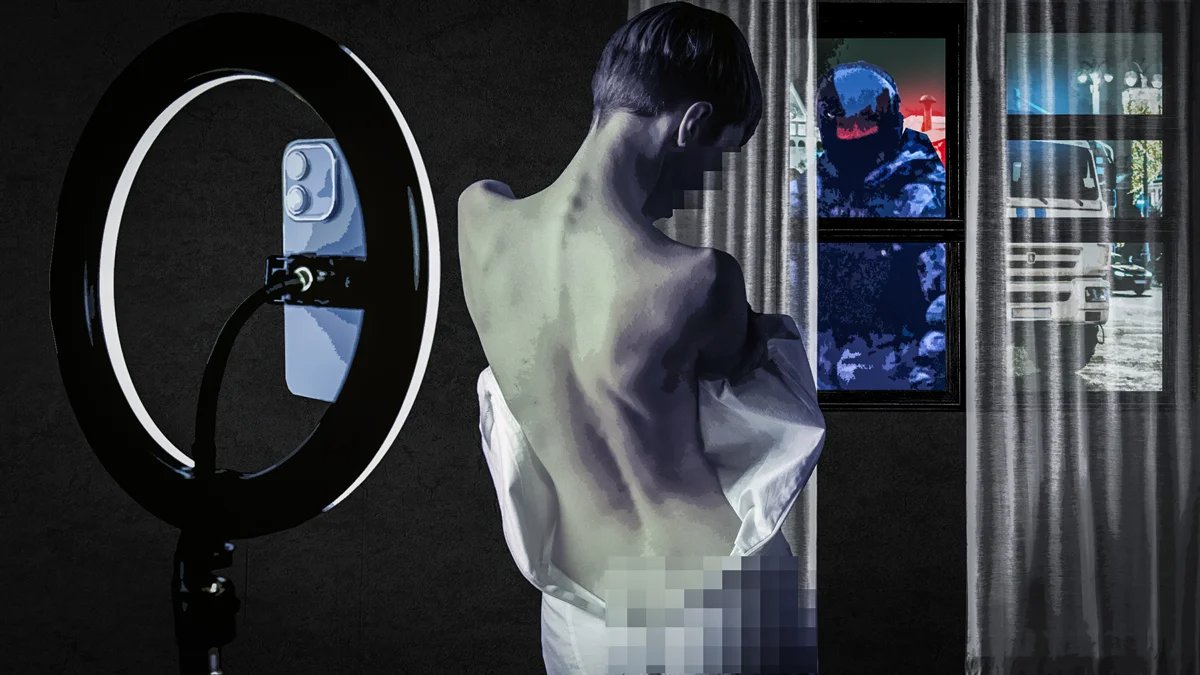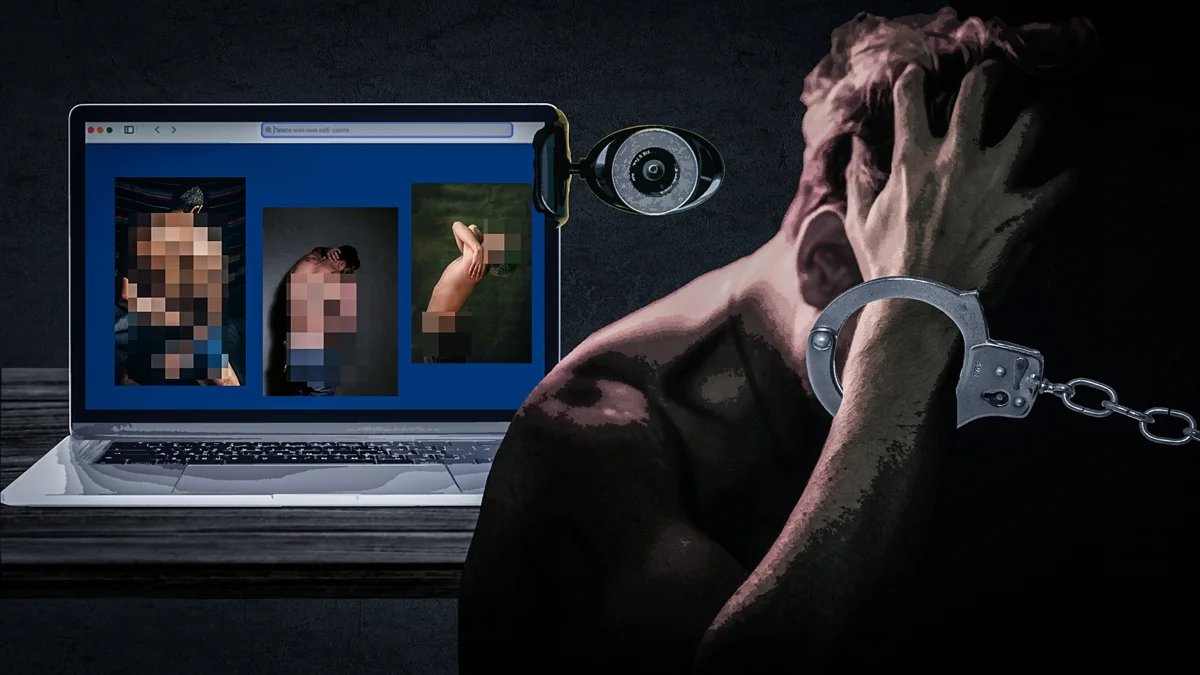Following a 2022 Supreme Court ruling that classified Russian webcam models as pornographers, convictions for “producing and disseminating pornographic material” soared. Novaya Gazeta Europe explores how this decision has dismantled a once-thriving business in Russia and provided law enforcement with a new tool to target sex workers.
Russia’s history restricting pornography dates back more than a century. In 1923, world leaders created an international treaty that criminalised the circulation of so-called obscene publications. The treaty was later ratified by the Soviet Union, but even after the country’s dissolution, Russia left the law unchanged.
In recent decades, as other European countries have decriminalised most pornography, with bans remaining on material involving animals and children, Russian leaders and conservative activists have been expanding the country’s definition of criminal pornography.
Online business
Webcam work in Russia was a legal grey area for more than a decade, and between the 2000s and the early 2010s, business was booming. Large cities hosted “studios”: apartments where administrators provided models with internet access and live streaming. The models would undress or perform erotic tasks for a paying audience that tuned in from across the country.
Technically, pornographic video and photography were illegal, but webcam models created live content, which was not. But in late 2022, the Supreme Court reinterpreted the law, ruling that “actions performed live” should be considered public demonstrations of pornography. This allowed the security forces to crack down on the webcam business and its employees.

Illustration: Novaya Gazeta Europe
The year after the Supreme Court’s ruling, criminal convictions on charges of “producing and disseminating pornographic material,” shot up to 326, from 230 convictions in 2022. The number of people sent to a penal colony on such charges more than doubled, from 14 in 2021, the year before the ruling, to 37 in 2023.
‘The police made me paranoid’
Filipp*, a former model and owner of a webcam studio in St. Petersburg, told Novaya, “You rent an apartment, make your workplace beautiful, install a computer and camera … and work away. No one thought they had to hide. Why would they? There was no reason to.”
Telegram chats are full of stories of security forces searching and raiding studios.
Polina agrees. She began working as a webcam model before the Supreme Court decision: “I got a job at a studio a few years ago, before the law changed. Back then, it wasn’t dangerous, so studio owners didn’t even mention risk. If the models were afraid of anything, it was their relatives finding out about the work that they did.”
The change in the law has made webcam models more vulnerable than ever before — a situation that has been readily exploited by studio owners. Models have even taken to online articles and social media to document their abuse.
Telegram chats are full of stories of security forces searching and raiding studios. “The police made me paranoid. I work at home now. All the studios I used to work at got busted. Now I’m wondering if they can track down models who work from home, because the city isn’t that big,” an anonymous model wrote on Telegram.
Most models seem to feel confident that working from home is safer, because it is harder for law enforcement to track down models one by one.
“Apparently, the studio where I used to work is now closed,” Polina said. “Maybe that’s because of law enforcement. At home, I can work in peace. As long as I’m not earning millions and not showing up at the top of web searches, no one cares.”
But almost every webcam business employee Novaya spoke with knows someone who has attracted the police’s attention. Polina’s friends who operated a studio in her home town were arrested in the summer of 2023.
Ultraconservative activists have increasingly wielded Russia’s anti-pornography laws against LGBTQ individuals, ushering in a new phase of persecution disguised as a defence of public morality.
“Everyone was tied up. The models and the administrators,” she said. “The admin guys were in pretrial detention for a year and a half, and faced five years in prison. Usually, models are treated like witnesses in these cases, but this time the court decided to go all out, so the models were charged too. Law enforcement tried to associate the studio to webcam businesses from other regions. The defendants all ended up with a suspended sentence.”
Homophobic activists
In recent years, Telegram has evolved into a sprawling marketplace of semi-private content, where many bloggers offer paid access to erotic photographs and videos. Now, a wave of state-backed hostility towards queer communities in Russia has shifted that balance too. Ultraconservative activists have increasingly wielded Russia’s anti-pornography laws against LGBTQ individuals, ushering in a new phase of persecution disguised as a defence of public morality.

Illustration: Novaya Gazeta Europe
One of the most high-profile examples of this trend unfolded in 2023, when Yekaterina Mizulina, head of the Safe Internet League, a Kremlin-adjacent body instrumental in directing Russia’s censorship apparatus, successfully lobbied for criminal charges against the transgender blogger Hilmi Forks, who was ultimately sentenced to three years in prison.
Mizulina had initially demanded charges for “promoting” transgender identity and LGBTQ+ lifestyles — a tactic aligned with the Kremlin’s growing reliance on anti-queer rhetoric. But prosecutors charged Forks with pornography distribution, reportedly because of videos containing “sexual scenes” posted to Forks’ private Telegram channel in late 2022.
One of the most confounding cases to date involves Matvey Volodin, a queer blogger who helmed the Telegram channel USSRboy. Volodin’s content was a curious blend of pornography and political musings — he was vocally pro-Putin and openly critical of what he called the “LGBTQ+ lobby”.
To support his argument that state homophobia was exaggerated, he frequently travelled to the North Caucasus — a region known for both its conservatism and its hostility towards queer people — to film content.
Volodin insisted that queer individuals were only targeted by the state when they “pushed” their identity onto others. To support his argument that state homophobia was exaggerated, he frequently travelled to the North Caucasus — a region known for both its conservatism and its hostility towards queer people — to film content.
In May 2024, Volodin travelled to Makhachkala, Dagestan’s capital, for what was meant to be a private party organised by local gay men. But the evening took a sinister turn when security forces raided the flat he was in. Some human rights activists and investigative journalists now believe that Volodin was being used as bait — drawn into a trap by local vigilante bloggers looking to expose and endanger queer men in the region.
Volodin himself rejected these accusations. After his arrest, he allegedly cooperated with police, granting them access to his phone. If the operation was a sting, it appears to have succeeded: his device was reportedly used to lure other men to similar setups.
Several months later, Volodin was released from a detention centre in Makhachkala and returned to Moscow. Though he briefly resumed posting, he eventually deleted his entire channel. Meanwhile, criminal cases were launched against his Dagestani acquaintances, also under the same anti-pornography statute. According to the human rights organisation North Caucasus SOS, two of the men managed to flee Russia, while a third received a suspended sentence after a period in pretrial detention.
(*names changed)
Join us in rebuilding Novaya Gazeta Europe
The Russian government has banned independent media. We were forced to leave our country in order to keep doing our job, telling our readers about what is going on Russia, Ukraine and Europe.
We will continue fighting against warfare and dictatorship. We believe that freedom of speech is the most efficient antidote against tyranny. Support us financially to help us fight for peace and freedom.
By clicking the Support button, you agree to the processing of your personal data.
To cancel a regular donation, please write to [email protected]

